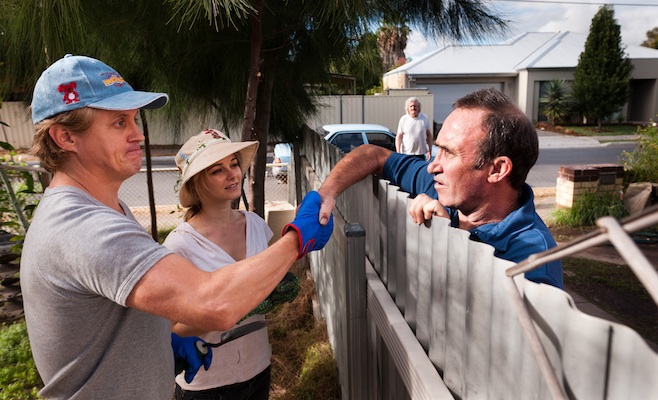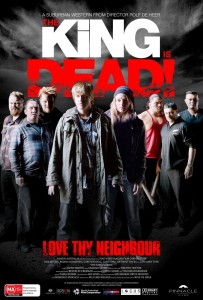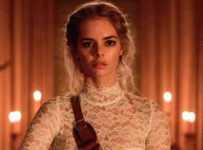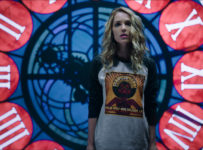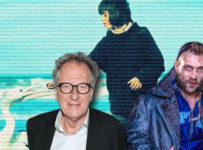Rolf de Heer returns his gaze to suburban Australia, and instead of melodrama he finds a quirky, murderous and very welcome dark side.
[stextbox id=”grey” caption=”The King Is Dead (2012)” float=”true” align=”right” width=”200″]
Director: Rolf de Heer
Writers: Rolf de Heer
Runtime: 102 minutes
Starring: Gary Waddell, Dan Wyllie, Bojana Novakovic, Luke Ford
Distributor: Pinnacle
Country: Australia
Rating (?): Better Than the Average Bear (★★★½)
For the last few decades, Australian cinema has been roughly divided between middle-class suburban angst and what can be broadly classified as ‘bogan comedy’. So it comes as little surprise that the eclectic filmmaker Rolf de Heer, best known for Bad Boy Bubby (1993) and the Cannes winning Ten Canoes (2006), traverses the genres with the same audacity that brought us the retro silent comedy Dr. Plonk (2007). The King Is Dead is as difficult to classify as anything else in de Heer’s filmography, as the Dutch-born director has long had a tradition of looking at his sunburnt home from the outside in.
De Heer’s script begins with a familiar scenario as upwardly mobile couple Max (Dan Wyllie) and Therese (the seemingly ubiquitous Bojana Novakovic) move into what appears to be an idyllic suburb. On one side, they begin to form a bond with a very relaxed couple and their young daughter. However, on the other side of their fence is the drug addled King (Gary Waddell), who allows loud parties and violent behaviour to continue to the chagrin of the neighbourhood. As a series of events engenders more spite from the street, and the police seem powerless to do anything. Max and Therese have no option but to take matters into their own hands.
Frost’s maxim of good fences making for good neighbours could never have imagined the complexity of twenty-first century Australian suburbia. In The King Is Dead, the fence provides the thinnest veneer between civility and hostility, and is a barrier than ultimately neither party respects. “We’re useless against the barbarians,” a resigned Max comments, in a role from Wyllie that plays with the darkly comic threads present in de Heer’s tale. In fact, he is mostly right, with the ‘correct’ channels of dealing with noisy neighbours not yielding any results, and actually making matters worse.
Equal parts thriller and comedy, de Heer’s script takes a darker turn somewhere in the middle following repeated attempts at home invasion. It never crosses the line into horror, but there are moments when de Heer plays with us by using familiar thriller tropes of that genre, almost encouraging our complicity in the comical violence that is to follow. This wouldn’t be possible without an impeccable cast, and everybody comes to the table in this regard. Wyllie downplays his more outgoing persona, while the flexible Novakovic effortlessly slips into paranoid suburgatory. Yet it is veteran character actor Waddell, as the titular King, who makes the surreal a stony-faced reality.
Even when de Heer somewhat frustratingly and deliberately labours the point, and the conclusion is delightfully over-the-top, The King Is Dead manages to keep audiences off-balance throughout, both through content and Ian Jones’s arresting photography. Satirically dissecting the middle-class as much as it is mocking ‘the other’, de Heer is commenting on the current climate of fear through a very funny, and sometimes quite spooky, examination of the suburbs.
The King Is Dead was released in Australian cinemas on 12 July 2012 from Pinnacle Films.

